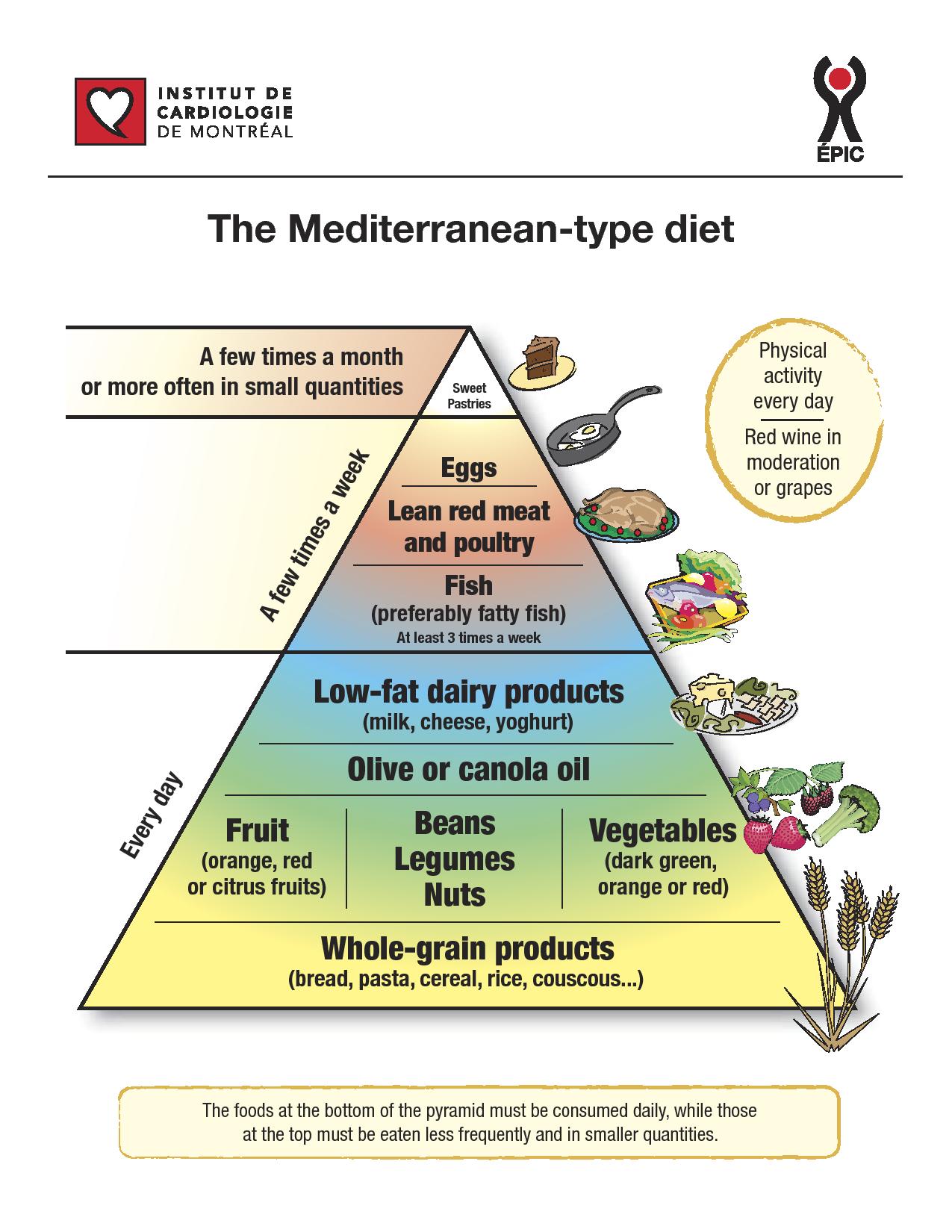Our knowledge in the areas of cardiovascular health and diet has greatly evolved in recent years. Numerous studies have demonstrated that the diets of Mediterranean populations carry many health benefits. This type of diet uses a holistic approach based on healthy food choices, the pleasure of eating, and variety. This is why the Montreal Heart Institute and the ÉPIC Centre recommend the Mediterranean diet.
What is the mediterranean diet ?

This diet has many benefits, some of which are described below.
High in dietary fibre
Dietary fibre is extremely good for your health.
The best sources are:
- whole grain products
- fruits and vegetables
- legumes and nuts
When eaten regularly, what is known as “soluble” fibre helps lower bad cholesterol (LDL) and control blood sugar in people with diabetes. This fibre is mainly found in:
- psyllium and cereals containing psyllium
- Metamucil®
- ground flaxseed
- chia seeds
- oat bran and oatmeal
- barley
- legumes (e.g., chick peas, red kidney beans, lentils)
- pectin-rich fruits (e.g., tomatoes, apples, oranges, pears, strawberries)
High in antioxidants
Antioxidants play a preventive role against coronary artery disease. They protect the artery walls and prevent arteriosclerosis.
The best sources are:
- colourful fruits and vegetables, particularly those that are dark green, orange or red
- red wine
- red grapes
- tea
- nuts and seeds (e.g., flax, chia, sunflower)
- legumes (e.g., chick peas, red kidney beans, lentils)
- soy and soy products (e.g., tofu, soy beverages, roasted soybeans)
However, we do not recommend antioxidants in supplement form (e.g., concentrated fruit and vegetable extracts, isoflavone tablets). The synergy between a food's various components is what gives it health benefits.
Healthy fats
This type of diet includes a more liberal intake of fat. Major importance is placed on high-quality fats, such as monounsaturated fats and polyunsaturated fats from the omega-3 family.
Monounsaturated fats have a positive effect on blood cholesterol and are mainly found in:
- olive oil and canola oil
- nuts (e.g., pecans, pistachios, almonds, hazelnuts, peanuts)
- natural olives
- nut butters (e.g., 100% natural peanut butter)
- avocados
Omega-3 fatty acids have many health benefits. They thin the blood, help lower triglycerides, control blood pressure, and support the body's anti-inflammatory system. Rich sources of omega-3 include:
- fatty fish (e.g., salmon, mackerel, trout, sardines)
- ground flaxseed
- chia seeds
- canola oil
- flaxseed oil
- walnuts
- soy and soy products (e.g., tofu, soy beverages, roasted soybeans)
Low in saturated fat, dietary cholesterol and trans fat
Saturated fat and dietary cholesterol are harmful, as they increase blood levels of bad cholesterol (LDL). These fats are mainly found in poultry skin, deli meats, high-fat dairy products, meat, butter, lard and eggs. Another source of saturated fat is tropical oils (palm, palm kernel, coconut and cottonseed).
In addition to raising bad cholesterol (LDL), trans fat makes LDL particles smaller and denser and lowers levels of good cholesterol (HDL). Trans fat is found in products that contain partially hydrogenated oils and modified oils as well as in vegetable shortening. Some examples of commercial food products that may contain trans fat are bakery products (cakes, pies, cookies), pastries (croissants, muffins, donuts), commercially prepared fried and battered foods, chocolate, crackers and fast food.
Moderate sodium intake
A high sodium (salt) intake contributes to higher blood pressure, which is a risk factor for cardiovascular disease. Processed foods are high in sodium, which is why this diet places importance on home-cooked meals.
To enhance flavour, herbs and spices have a prominent place, while sodium (table salt, sea salt, natural salt, vegetable salt) is only used in moderation.
Overall
The Mediterranean diet stresses home-cooked meals that feature the following key foods:
- whole grain products
- colourful fruits and vegetables
- legumes
- soy and soy products (e.g., tofu, soy beverages, roasted soybeans)
- olive oil and canola oil
- fish
- nuts
- flaxseed and chia seeds
This type of diet therefore has a positive impact on all cardiovascular disease risk factors that are modifiable through diet (hypertension, dyslipidemia, obesity and diabetes).
